Munch your way to a brighter day with the foods science increasingly suggests can make you feel happier.
For decades, our culture has focused on the connection between healthy eating and physiological wellness—most of all, related to weight. But out of a pandemic that made mental health a hot topic, you might also be gaining an awareness that the foods you eat can seriously affect your mind.
Research published in The British Medical Journal says the human diet plays a major role in how both our body and our brain are feeling. Poor nutrition can lead to experiences like depression, anxiety, aggression (there’s a reason the word “hangry” exists!). But improving your diet, and knowing the right foods to eat, may help your mental health.
Rachel Engelhart, RD, LPC, a registered dietitian and certified intuitive eating counselor, says certain foods can support your body’s processes that are responsible for positive moods and strong energy levels. Here’s Engelhart’s list of the greatest good-mood foods.
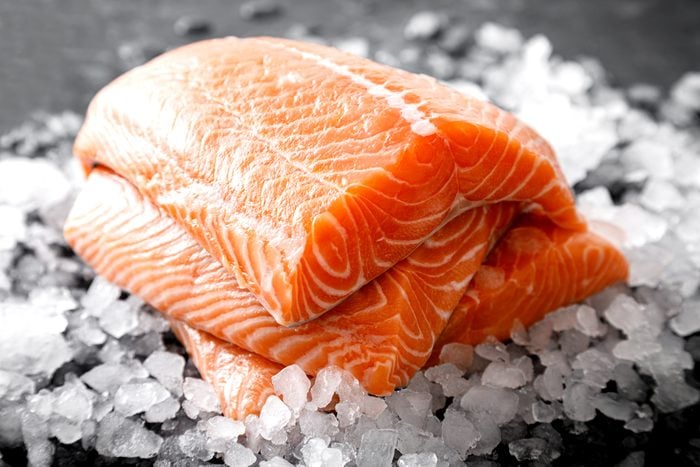 |
IVANDSYUBA/GETTY IMAGES |
Fatty Fish
Seafood like salmon, mackerel, and canned tuna are rich in omega-3 fatty acids, which are “healthy fats” with benefits throughout your body from your heart to your eyes—and your brain.
“Omega-3 fatty acids are anti-inflammatory and have the ability to cross into the brain, having a direct effect on mood-regulating molecules and neurotransmitters there,” says Kelsey Lorencz, RDN, registered dietitian at Graciously Nourished. Research has consistently linked low levels of omega-3s with mood disorders like depression and anxiety—and, according to a review published in Frontiers in Physiology, most of us don’t get enough omega-3 fats in our diet.
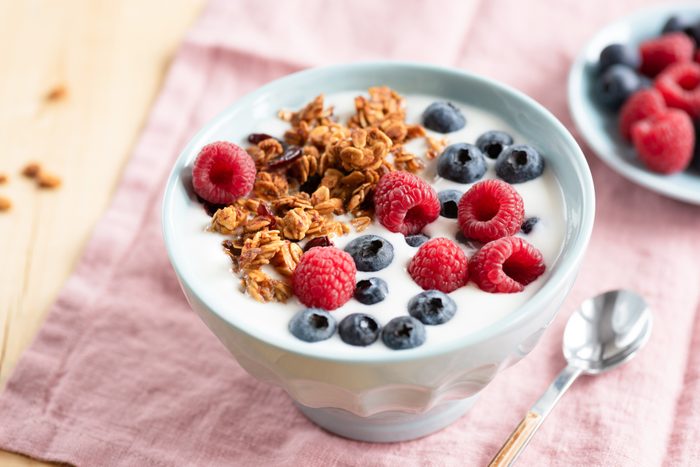 |
ARX0NT/GETTY IMAGES |
Yogurt
Says Lorencz: “The bacteria in your gut can actually produce feel-good neurotransmitters like serotonin and dopamine.”
Research has identified a particular bacterium that may have a strong impact on triggering these chemicals: it’s a strain called Lactobacillus. One study published in the journal Nature found that feeding our gut with this good bacteria—found naturally in foods like yogurt, kefir, and sauerkraut—doesn’t just keep the blues at bay, it can increase our resilience in the face of stress.
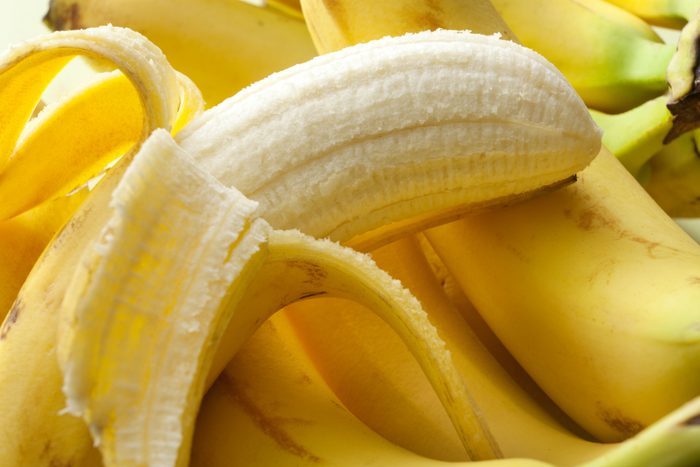 |
FLOORTJE/GETTY IMAGES |
Bananas
Bananas aren’t just shaped like a smile—they’re a mood-boosting powerhouse. That’s in part because they’re also high in vitamin B6, one nutrient behind the production of the “happiness hormone” serotonin. Bananas contain prebiotic fiber, which, along with that Lactobacillus, are essential for gut health that promotes a happy brain.
Bonus: bananas may also help you get a great night’s sleep, which can definitely be an outlook-lifter.
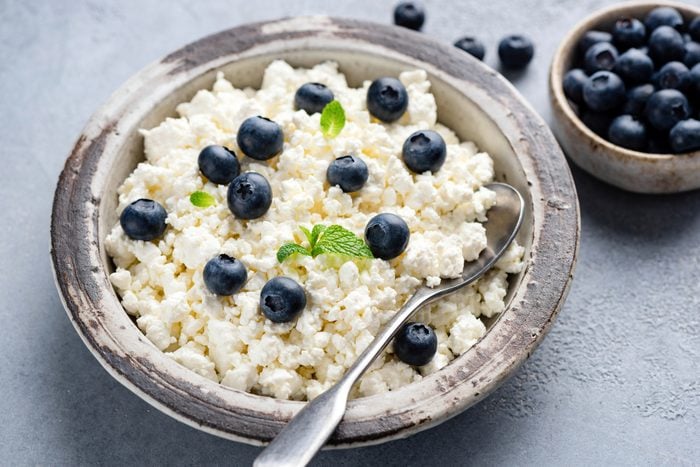 |
| ARX0NT/GETTY IMAGES |
Cottage Cheese
“The amino acid L-tyrosine is needed to make dopamine and norepinephrine, two neurotransmitters that affect our mood and can easily become depleted,” Lorencz says. She points to high sources like soy products, chicken, fish, nuts, seeds, avocados, and bananas. But cottage cheese has a whopping amount of this amino acid, along with a few other mood-boosters in its arsenal. It’s high in protein, which is essential for our body to make and use its mood-promoting hormones, Engelhart says. (This protein is casein protein, which our body absorbs more slowly—sustaining energy levels—and may contribute to elevated moods, according to ongoing research.)
Cottage cheese also contains selenium, a mineral that Nutrients research has suggested may be linked with lower rates of depression.
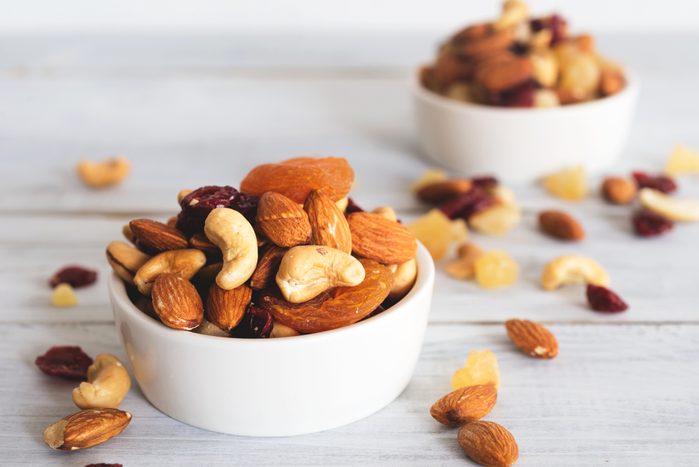 |
PREMYUDA YOSPIM/GETTY IMAGES |
Nuts and Seeds
Magnesium is a mineral that supports our body’s energy production—and not getting enough can lead to irritability, anxiety, sleeplessness, and agitation, says Lorencz. Nuts like almonds, walnuts, cashews, and seeds like pumpkin, chia, and sesame are great sources of this vital nutrient, as well as tryptophan, an amino acid associated with good moods.
Nuts and seeds can also be great vegetarian sources of those crucial omega-3 fatty acids.
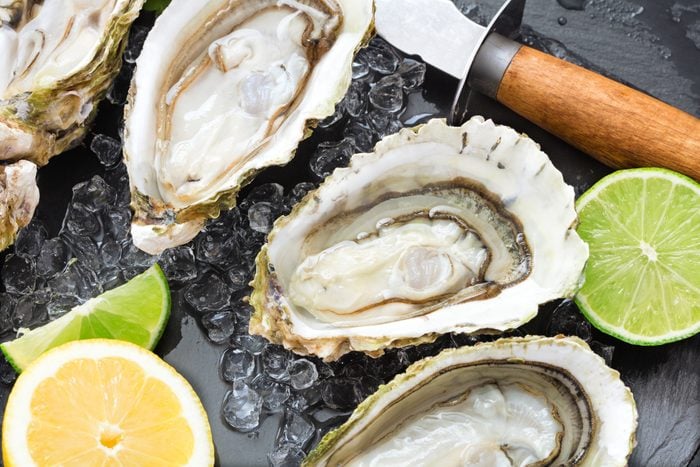 |
PINEAPPLE STUDIO/GETTY IMAGES |
Oysters
The ages-old wives’ tale about oysters as aphrodisiacs is still out for debate…but even minus the physical excitement, oysters can elevate one’s mood. They pack the highest zinc content of any food—a nutrient that’s linked with anxiety and depression when we’re deficient, says Lorencz—and contain tyrosine, an amino acid that helps our body produce the “feel good” hormone dopamine.
That’s great news for the shellfish-loving set. However, if you aren’t a fan of oysters, you can get this one-two mood-boosting punch from foods like eggs, nuts, and legumes.
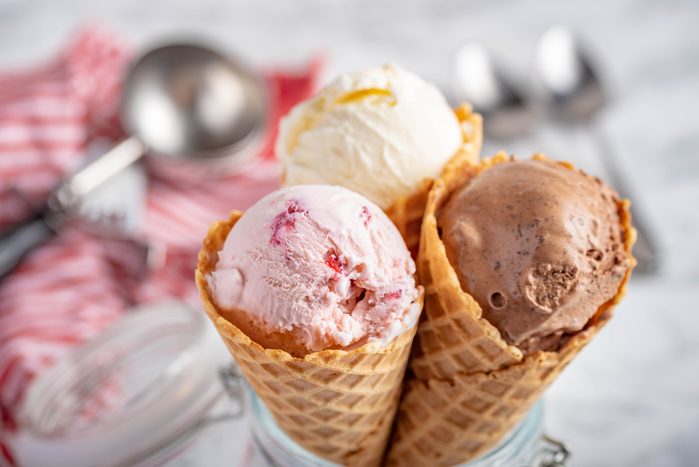 |
AHIRAO_PHOTO/GETTY IMAGES |
Your Favorite Treat
“Having a varied diet is the best way to set your body up to produce the ‘feel good’ hormones that it needs,” Engelhart says, adding an important point: while this nutritious balance is important, so is treating yourself to foods you enjoy. “So many of my clients are hard on themselves and rather judgemental around their food choices, and it negatively impacts their mood,” she says. “Sprinkling our day with a delicious coffee, a yummy dessert, or one of our favorite restaurant meals is also an important way to positively impact our mental health.”
And if you want to be strategic about that treat, reach for some dark chocolate. Chocolate contains natural serotonin, and 2022 research found that dark chocolate has prebiotic effects in our gut, supporting stronger mental health.
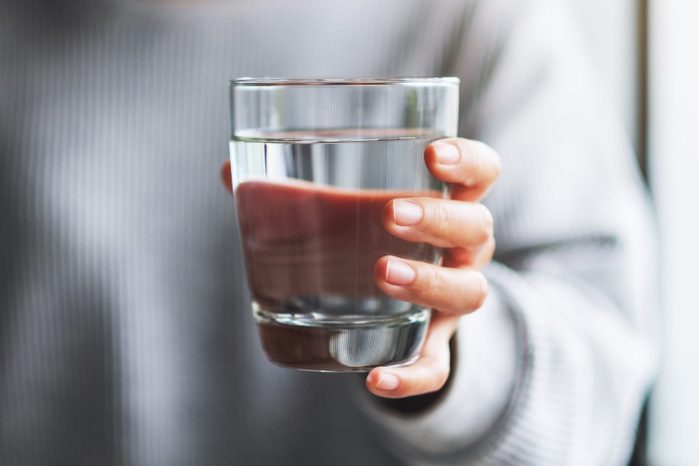 |
FARKNOT_ARCHITECT/GETTY IMAGES |
Bonus: Water
Not a food, but water is worth an honorable mention. “Staying hydrated is an easy way to help us experience an improved mood,” Engelhart says. Getting enough water helps prevent headaches, brain fog, fatigue, and body aches—each enough to send anyone into a foul mood.
And, studies show that as our water intake goes up, symptoms of low mood, tension, and depression go down. (For a guide, here’s how much water you should drink every day.)
Sources:
People:
- Rachel Engelhart, RD, LPC, a certified intuitive eating counselor
- Kelsey Lorencz, RDN, Registered Dietitian at Graciously Nourished
Journals:
- BMC Medicine: "Multiple lifestyle factors and depressed mood: a cross-sectional and longitudinal analysis of the UK Biobank (N = 84,860)"
- The BMJ: "Food and mood: how do diet and nutrition affect mental wellbeing?"
- Frontiers in Physiology: "Possible antidepressant mechanisms of omega-3 polyunsaturated fatty acids acting on the central nervous system"
- Frontiers in Psychiatry: "Effects of Probiotics on Cognitive Reactivity, Mood, and Sleep Quality"
- Nature: "Microbiota alteration is associated with the development of stress-induced despair behavior"
- Nutrients: "A Systematic Review and Meta-Analysis of B Vitamin Supplementation on Depressive Symptoms, Anxiety, and Stress: Effects on Healthy and 'At-Risk' Individuals"
- Trials: "The Moo'D Study: protocol for a randomised controlled trial of A2 beta-casein only versus conventional dairy products in women with low mood"
- Nutrients: "Zinc, Magnesium, Selenium and Depression: A Review of the Evidence, Potential Mechanisms and Implications"
- The Journal of Nutritional Biochemistry: "Consumption of 85% cocoa dark chocolate improves mood in association with gut microbial changes in healthy adults: a randomized controlled trial"
Websites:
- National Library of Medicine: "A systematic review of the effect of L-tryptophan supplementation on mood and emotional functioning"
- National Library of Medicine: "Habitual total water intake and dimensions of mood in healthy young women"
Important Notice: This article was originally published at www.thehealthy.com by Leslie Finlay where all credits are due.
Disclaimer
The watching, interacting, and participation of any kind with anything on this page does not constitute or initiate a doctor-patient relationship with Veripeudic.com or Life Preserver. None of the statements here have been evaluated by the Food and Drug Administration (FDA). The products of Veripeudic.com or Life Preserver are not intended to diagnose, treat, cure, or prevent any disease. The information being provided should only be considered for education and entertainment purposes only. If you feel that anything you see or hear may be of value to you on this page or on any other medium of any kind associated with, showing, or quoting anything relating to Veripeudic.com or Life Preserver in any way at any time, you are encouraged to and agree to consult with a licensed healthcare professional in your area to discuss it. If you feel that you’re having a healthcare emergency, seek medical attention immediately. The views expressed here are simply either the views and opinions of Veripeudic.com or Life Preserver or others appearing and are protected under the first amendment.
Veripeudic.com or Life Preserver promotes evidence-based natural approaches to health, which means integrating her individual scientific and clinical expertise with the best available external clinical evidence from systematic research. By individual clinical expertise, I refer to the proficiency and judgment that individual clinicians acquire through clinical experience and clinical practice.
Veripeudic.com or Life Preserver does not make any representation or warranties with respect to the accuracy, applicability, fitness, or completeness of any multimedia content provided. Veripeudic.com or Life Preserver does not warrant the performance, effectiveness, or applicability of any sites listed, linked, or referenced to, in, or by any multimedia content.
To be clear, the multimedia content is not intended to be a substitute for professional medical advice, diagnosis, or treatment. Always seek the advice of your physician or other qualified health providers with any questions you may have regarding a medical condition. Never disregard professional medical advice or delay in seeking it because of something you have read or seen in any website, video, image, or media of any kind. Veripeudic.com or Life Preserver hereby disclaims any and all liability to any party for any direct, indirect, implied, punitive, special, incidental, or other consequential damages arising directly or indirectly from any use of the content, which is provided as is, and without warranties.


